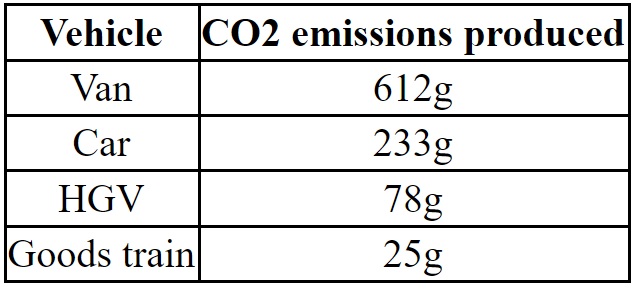|
|
|
|
 |
|
|
|
|
CILT INTERNATIONAL - NEXT-DAY DELIVERY DEMAND WILL DRIVE UP CARBON EMISSIONS WITHOUT CHANGE
Wednesday 21/07/2021
Decarbonisation named “single greatest long-term challenge” to supply chain by international transport & logistics leader
LONDON, July 21 (Bernama-BUSINESS WIRE) -- Growing demand for e-commerce delivery will result in 36% more delivery vehicles in inner cities by 2030 according to the Chartered Institute of Logistics and Transport (CILT) International. These findings come despite new policy proposals from the UK and EU in the ongoing global pursuit of net-zero carbon emissions.
This press release features multimedia. View the full release here:
https://www.businesswire.com/news/home/20210721005428/en/
Keith Newton, Secretary-General of the Chartered Institute of Logistics and Transport International, said:
“Policy commitments to decarbonisation are a necessary start, but if governments are to actually make a difference and achieve net zero emissions, they need to act as bridge between businesses, consumers, and transport industry professionals. Decarbonisation is the single greatest long-term challenge facing the transport and logistics industry, but lasting positive change will only come with changes in business and consumer habits.
“Put simply, businesses are influenced by consumer decisions. If there is continued consumer demand for services such as next day delivery, businesses will understandably continue to provide them, driving a rise in vehicle demand and emissions levels.”
CILT International further found that consequently, emissions from delivery traffic will increase by 32% and congestion will rise by over 21%, equalling an additional 11 minutes of commute time for each passenger every day. These figures do not account for additional factors such as the impact of Next Day Delivery: same-day and instant delivery are the fastest-growing segments in the last-mile. For example, Amazon in their key markets despatch 75% of their parcels on a next day basis.
- In Europe, same-day delivery accounts for only 5% of deliveries so far.
- China is a fast-growing market in which same day and instant delivery already make up more than 10% of overall parcel deliveries – more than double European deliveries.
- This accounts for roughly 3 million daily, same-day items with approximately 400,000-500,000 instant deliveries.
- Developed and developing markets are all seeing the Next Day Delivery offer increase the fastest.
Environmental Impact Factors:
The CO2 impact of the Next Day Delivery boom is accentuated by the fact that the traditional vehicle for home delivery is the white van. In the UK in the last quarter of 2020 after the 2nd wave of the pandemic van sales increased by 8.8% Y on Y.
Kilometre by kilometre emissions comparison:

Keith Newton, Secretary-General of CILT International, added:
“There are many factors to build in when considering the environmental impact of the Next-Day Delivery phenomenon. These include safety on the roads, advanced transport & urban planning, managing vehicle use and routes, clean air factors, and safe segregation of vehicles and people. Governments internationally must work with professional bodies and industry practitioners to assess demonstrate viable alternatives and pursue new solutions to the Next-Day-Delivery demand.”
Solutions to reduce Next Day delivery impacts include:- Electrification of vehicles – targets in UK to deliver all home deliveries by 2030
- Reduction of the number of journeys through better delivery and service planning,
- Consolidation of deliveries or consolidated pick up and drop off points rather than home delivery
- Spreading deliveries over 24 hours and 7 days
- Alternative urban delivery methods such as bikes, milk floats etc
- The management of consumer expectations with more focus on delivery consistency rather than immediate delivery
- Engagement with the consumer to increase understanding of the “green” impacts of delivery choice
ENDS
Notes to Editors:
ABOUT CILT
The Chartered Institute of Logistics and Transport (CILT) is the leading professional body for everyone who works in supply chain, logistics and transport. Founded in 1919, CILT now operates in 37 countries worldwide. As well as being a membership organisation, CILT supports Logistics and Transport professionals at every stage of their career, from students to professors, government ministers, and directors.
Services offered globally by CILT include expertise and information to help shape and influence government policy; professional and Chartered qualifications; industry benchmarking; professional networking (including networks such as Women in Logistics and Transport (WiLAT); and internationally recognised membership and qualifications.
ABOUT KEITH NEWTON
Keith Newton is the Secretary General of CILT. His role is to lead and facilitate the international direction of the organisation, bringing together its strengths and helping to set and establish global professional standards. Keith assumed this role in 2012 and possesses over 30 years’ experience in supply chain operational management and as an Institute member.
View source version on businesswire.com:
https://www.businesswire.com/news/home/20210721005428/en/
Contact
For media enquiries, contact:
John Kaponi, J7 Communications
E: john.kaponi@j7comms.com | T: +44 787 554 2969
Hannah Ritchie, J7 Communications
E: hannah.ritchie@j7comms.com | T: +44790 4404 439
Source: CILT International
--BERNAMA |
|
|
|
|
|